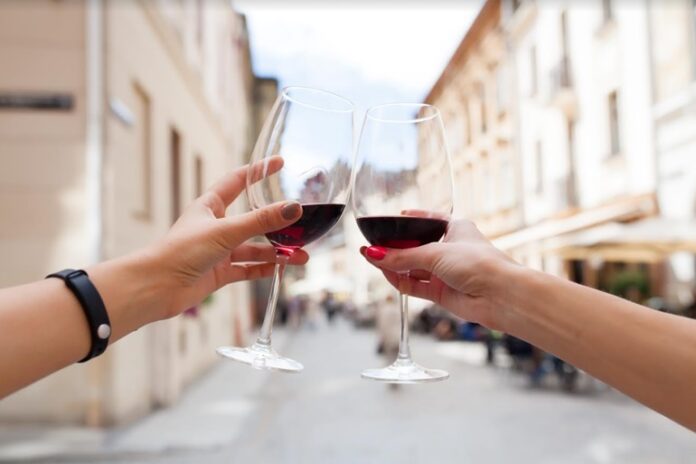Nestled in the heart of Tuscany, Florence is a city celebrated for its cultural richness, historical splendor, and its remarkable wine. A journey through Florence’s wine culture is not merely a sip; it’s an exploration, a symphony for the senses, a timeless art form of appreciating the nectar of the gods.
In this article, we will embark on an incredible food and wine tour in Florence, Italy. Get your taste buds ready!
Understanding the essence of wine-tasting
Wine tasting is more than just a pleasurable act; it’s an art form that engages multiple senses. The swirling, smelling, sipping, and savoring of the wine engages sight, smell, taste, and touch. Each step reveals nuances and subtleties, a story within the glass waiting to be unveiled.
The Five S’s of wine tasting
Wine tasting follows a specific ritual: See, Swirl, Smell, Sip, and Savor. The “See” involves examining the wine’s color and clarity, while the “Swirl” helps to aerate the wine, releasing its aromas. The “Smell” lets one perceive the wine’s bouquet, distinguishing between fruity, floral, or oaky scents. The “Sip” lets the flavors dance on the palate, while the “Savor” reveals the wine’s finish. The lingering taste remains.
Exploring Florence’s wineries and vineyards
Florence boasts an array of wineries and vineyards, each offering a unique experience for wine enthusiasts. The rolling hills of Tuscany, adorned with vineyards, create a picturesque backdrop for wine-tasting adventures.
Wine enthusiasts can visit vineyards nestled in the Chianti region, known for its remarkable Sangiovese grapes, or explore wineries situated in the hillsides, such as Fiesole, and revel in the stunning panoramic views while indulging in tastings of world-class wines.
The magic of Tuscan wines
Florence offers various Tuscan wines, including Chianti, Brunello di Montalcino, and Vernaccia di San Gimignano, each with distinctive characteristics and charm.
Chianti, renowned for its bold reds, delivers a combination of cherry, plum, and earthy notes. Brunello di Montalcino entices with its robust and complex flavors, while Vernaccia di San Gimignano, a crisp white, delights with its freshness and citrus hints.
Wine-tasting etiquette and companionship
Wine tasting in Florence is not just about the wine; it’s also about the experience. Engaging with knowledgeable sommeliers or winemakers allows a deeper understanding of the wine’s journey from vine to bottle. Moreover, sharing this experience with friends or fellow enthusiasts enhances the pleasure and offers a space for lively discussions and appreciation.
Pairing wine with Tuscan cuisine
Engaging in a food and wine tour Florence Italy, is the perfect choice to learn in-depth about the local wine. The art of wine tasting finds its ideal complement in Tuscan cuisine. Florence’s local delicacies, such as ribollita, pappa al pomodoro, and bistecca alla Fiorentina, pair harmoniously with the region’s wines, creating a delightful culinary symphony for the taste buds.
The art of terroir and viticulture
Florence’s winemaking tradition is deeply rooted in the concept of terroir. The region’s diverse soils, climatic conditions, and elevation play a pivotal role in shaping the character of its wines. The art of viticulture here extends beyond the cultivation of grapes; it’s an intimate understanding of the land, a synergy between nature’s elements and human craftsmanship that results in the distinct terroir-driven flavors in every glass.
Eco-friendly wine practices
Many wineries in and around Florence have embraced eco-friendly practices. From sustainable viticulture to organic and biodynamic farming methods, these wineries prioritize environmental preservation. Visitors have the opportunity not only to taste exceptional wines but also to support a sustainable approach to winemaking, contributing to the conservation of the region’s natural resources.
Wine and cultural heritage
The art of wine in Florence is deeply interwoven with the city’s cultural heritage. The history of winemaking here dates back centuries, with the influence of Etruscans and Romans shaping the region’s viticulture. Tasting wine in Florence is a taste of history, an exploration of the legacy passed down through generations.
Wine festivals and events
Throughout the year, Florence hosts various wine-centric events and festivals. From the renowned Chianti Classico Expo to the vibrant Wine Town Festival, these celebrations offer visitors a chance to immerse themselves in the local wine culture.
These events showcase a rich tapestry of wines, often accompanied by live music, traditional performances, and delectable food pairings, creating an enriching and festive experience.
Art and wine: Visiting wineries as galleries
Several wineries in Florence double as art galleries. These unique spaces blend enological and artistic expressions, displaying contemporary and classical art alongside the wine-tasting experience. Visitors can appreciate fine art while savoring the artistry found in every glass of wine.
The science of aging wines
Florence’s wineries pride themselves on their mastery of aging wines. With cellars dating back generations, winemakers in the region employ traditional methods and modern technology to age their wines. Visitors can witness the process of aging in oak barrels or large casks, adding complexity and character to the wines.
Wine tourism and workshops
In recent years, wine tourism in Florence has gained significant popularity. Visitors can engage in workshops and experiences, learning about wine production, grape varietals, and the intricate art of wine blending. Guided tours and hands-on workshops enable participants to deepen their understanding of the winemaking process.
Innovative wine pairings and experiences
Wineries in Florence often offer unique wine-pairing experiences. Some feature unexpected pairings, such as wine and chocolate or wine and cheese, providing an adventurous exploration of complementary flavors and textures. These innovative pairings allow visitors to discover new taste dimensions and enhance their appreciation of the wines.
The future of Florence’s wine industry
The future of Florence’s wine industry is one of continued innovation and preservation. Winemakers continue experimenting with grape varietals, sustainable practices, and cutting-edge technology while honoring the region’s rich winemaking traditions, ensuring a vibrant and evolving wine culture for generations.
Conclusion
The art of wine tasting in Florence is not merely a sensory journey but an immersion into the cultural and historical essence of the region.
